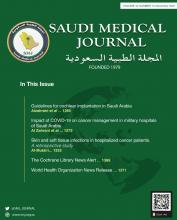Abstract
Objectives: To determine the prescription pattern of proton pump inhibitors (PPIs) at a tertiary hospital in Saudi Arabia.
Methods: This study was a retrospective cohort design using medical records at the medical ward of King Abdulaziz University Hospital (KAUH), Jeddah, Saudi Arabia. Data were collected from medical records of all patients admitted to the ward from October 2019 to March 2020.
Results: A total of 1135 medical records were retrieved, of which 709 (62.5%) were prescribed PPIs. The frequency of PPIs prescribed was highest in March 2020 (21.7%) relative to the remaining months. Omeprazole was the most prescribed PPI (84.5%), compared to pantoprazole (15.5%). The PPIs were commonly administered through oral (56.7 %), compared to intravenous route (43.3%). The PPIs were prescribed to most patients (58.4%) on the first day of admission, and 6.5% were prescribed for indications other than those approved by the Food and Drug Administration.
Conclusion: This study demonstrates that PPIs are frequently prescribed among most patients at the medical ward of KAUH, Kingdom of Saudi Arabia. We found that the PPIs were prescribed to many patients inappropriately (not based on clinical guidelines). These results suggest the need for educational interventions among physicians on rational prescription.
Footnotes
Disclosure. Authors have no conflict of interests, and the work was not supported or funded by any drug company.
- Received August 22, 2021.
- Accepted October 18, 2021.
- Copyright: © Saudi Medical Journal
This is an Open Access journal and articles published are distributed under the terms of the Creative Commons Attribution-NonCommercial License (CC BY-NC). Readers may copy, distribute, and display the work for non-commercial purposes with the proper citation of the original work.






